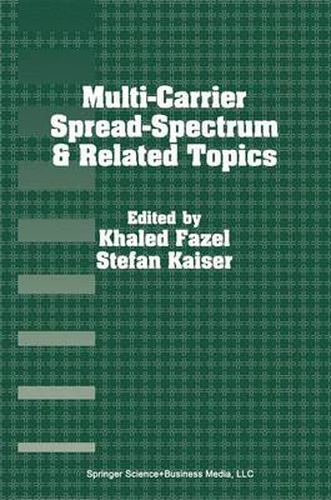Readings Newsletter
Become a Readings Member to make your shopping experience even easier.
Sign in or sign up for free!
You’re not far away from qualifying for FREE standard shipping within Australia
You’ve qualified for FREE standard shipping within Australia
The cart is loading…






This title is printed to order. This book may have been self-published. If so, we cannot guarantee the quality of the content. In the main most books will have gone through the editing process however some may not. We therefore suggest that you be aware of this before ordering this book. If in doubt check either the author or publisher’s details as we are unable to accept any returns unless they are faulty. Please contact us if you have any questions.
The benefits and success of multi-carrier (MC) modulation on one side and the flexibility offered by the spread spectrum (SS) technique on the other side has motivated many researchers to investigate the combination of both techniques since 1993. This combination, known as multi-carrier spread-spectrum (MC-SS), benefits from the main advantages of both systems and offers high flexibility, high spectral efficiency, simple detection strategies, narrow-band interference rejection capability and more. The basic principle of this combination is straightforward: the spreading is performed as direct sequence spread-spectrum (DS-SS) but instead of transmitting the chips over a single carrier, several sub-carriers could be employed. The MC modulation and demodulation can easily be realized in the digital domain by performing IFFT and FFT operations. The separation of the users’ signals could be performed in the code domain. This means that the MC-SS system performs the spreading in the frequency domain, which allows for simple signal detection strategies. Since 1993, MCSS has been deeply studied and new alternative solutions have been proposed. Meanwhile, deep system analysis and comparison with DS-CDMA have been performed that show the superiority of MC-CDMA. The aim of this volume is to edit the ensemble of contributions and research results in this field presented during three days at the Third International Workshop on Multi-Carrier Spread-Spectrum (MC-SS) and Related Topics, held in Oberpfaffenhofen, Germany.
$9.00 standard shipping within Australia
FREE standard shipping within Australia for orders over $100.00
Express & International shipping calculated at checkout
This title is printed to order. This book may have been self-published. If so, we cannot guarantee the quality of the content. In the main most books will have gone through the editing process however some may not. We therefore suggest that you be aware of this before ordering this book. If in doubt check either the author or publisher’s details as we are unable to accept any returns unless they are faulty. Please contact us if you have any questions.
The benefits and success of multi-carrier (MC) modulation on one side and the flexibility offered by the spread spectrum (SS) technique on the other side has motivated many researchers to investigate the combination of both techniques since 1993. This combination, known as multi-carrier spread-spectrum (MC-SS), benefits from the main advantages of both systems and offers high flexibility, high spectral efficiency, simple detection strategies, narrow-band interference rejection capability and more. The basic principle of this combination is straightforward: the spreading is performed as direct sequence spread-spectrum (DS-SS) but instead of transmitting the chips over a single carrier, several sub-carriers could be employed. The MC modulation and demodulation can easily be realized in the digital domain by performing IFFT and FFT operations. The separation of the users’ signals could be performed in the code domain. This means that the MC-SS system performs the spreading in the frequency domain, which allows for simple signal detection strategies. Since 1993, MCSS has been deeply studied and new alternative solutions have been proposed. Meanwhile, deep system analysis and comparison with DS-CDMA have been performed that show the superiority of MC-CDMA. The aim of this volume is to edit the ensemble of contributions and research results in this field presented during three days at the Third International Workshop on Multi-Carrier Spread-Spectrum (MC-SS) and Related Topics, held in Oberpfaffenhofen, Germany.